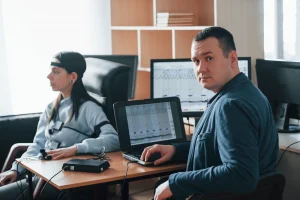In the fast-paced world of California’s bustling cities and scenic landscapes, accidents can happen at any time. When they do, individuals often focus on the visible injuries, such as broken bones or bruises, but there’s another, less obvious, yet equally critical concern to address: Traumatic Brain Injuries (TBIs). This 3000-word blog post will delve into the nuances of TBIs in California, offering insights into what they are, how they occur, their symptoms, and the legal aspects surrounding them.
Caring for Traumatic Brain Injuries (TBIs) in San Francisco, California: An In-Depth Guide
Traumatic Brain Injuries, or TBIs, are a serious health concern that can affect anyone involved in accidents, from car collisions on the bustling streets of Los Angeles to falls in the beautiful Yosemite National Park. TBIs are characterized by damage to the brain caused by external forces, and they often go unnoticed or misdiagnosed in the immediate aftermath of an accident.
A. Significance of TBIs
California, known for its vibrant lifestyle, is also a state where accidents occur frequently. Understanding the significance of TBIs is crucial for residents and visitors alike. While you might feel physically fine after an accident, you may still have sustained a TBI that could have long-term consequences.
B. Aim of the Article
This article aims to provide comprehensive information about TBIs in San Francisco, California. We’ll explore what TBIs are, how they manifest, the importance of early diagnosis, and the legal implications involved.
What Are Traumatic Brain Injuries (TBIs)?
A. Definition
A TBI is a disruption of normal brain function caused by a blow, jolt, or penetrating head injury. It ranges from mild concussions to severe injuries, potentially resulting in long-term impairments or even fatalities.
B. Mechanism of Injury
TBIs typically occur due to:
- Car Accidents: The busy Californian roads can be the stage for car accidents, a common cause of TBIs.
- Falls: Whether in urban areas or natural wonders like Yosemite, falls can lead to head injuries.
- Sports and Recreation: California’s active lifestyle includes sports, which can pose TBI risks.
- Assaults: Unfortunately, incidents of violence can also result in TBIs.
C. The Severity Spectrum
TBIs can be classified into three categories:
- Mild: Often referred to as concussions, mild TBIs may not involve a loss of consciousness but can still have significant effects.
- Moderate: These TBIs result in more pronounced symptoms and potential long-term impairments.
- Severe: Severe TBIs are life-threatening, causing extended unconsciousness or memory loss.
Symptoms and Signs of TBIs
TBIs exhibit a wide range of symptoms, some of which might not be immediately apparent. This section explores the signs to watch for, which could be indicative of a TBI.
A. Physical Symptoms
- Headaches: Persistent or worsening headaches post-accident.
- Nausea and Vomiting: Feeling nauseous or vomiting after an accident.
- Balance Issues: Difficulty maintaining balance or dizziness.
- Loss of Consciousness: Any loss of consciousness, no matter how brief.
B. Cognitive Symptoms
- Memory Loss: Difficulty remembering events before or after the accident.
- Confusion: Feeling disoriented, having trouble concentrating, or understanding.
- Slurred Speech: Difficulty speaking clearly or coherently.
C. Emotional and Behavioral Symptoms
- Mood Swings: Unexplained and intense mood swings.
- Irritability: Easily becoming agitated or angered.
- Depression and Anxiety: Sudden and persistent feelings of sadness or unease.
D. Sensory Symptoms
- Blurred Vision: Difficulty focusing or seeing clearly.
- Ringing in the Ears: Persistent or intermittent ringing sounds.
- Sensitivity to Light or Sound: Overreaction to light or noise.
E. Sleep Disturbances
- Insomnia: Difficulty falling asleep or staying asleep.
- Excessive Sleepiness: Feeling excessively tired during the day.
The Importance of Early Medical Attention
Early diagnosis and medical intervention are critical for individuals who might have sustained a TBI. Even if you feel physically fine after an accident, the presence of any of the aforementioned symptoms should prompt immediate medical attention.
A. Consequences of Neglecting TBIs
Failing to address TBIs promptly can lead to:
- Prolonged Recovery: Delayed diagnosis can result in longer recovery times.
- Permanent Damage: TBIs can cause irreversible damage if left untreated.
- Legal Complications: Delayed diagnosis may affect legal claims.
B. Legal Implications
In California, TBIs are taken seriously in legal contexts. Understanding the legal implications of TBIs is crucial, as they can significantly impact personal injury claims, insurance settlements, and compensation.
Seeking Medical Attention and Diagnosis
A. Consulting Medical Professionals
After an accident that might have caused a TBI, it is crucial to seek advice from medical professionals. Here are the steps to follow:
Primary Care Doctor: Schedule an appointment with your primary care doctor. Inform them about the accident and any symptoms you’re experiencing.
Urgent Care or Emergency Room: If your symptoms are severe or require immediate attention, visit the nearest urgent care facility or emergency room. Your health should be the top priority.
Document Everything: Maintain a detailed record of your symptoms, medical visits, conversations with doctors, and any recommended tests or treatments.
B. Diagnostic Tests
Medical professionals may recommend various tests to diagnose a TBI, including:
- CT Scan: This imaging test can reveal bleeding, swelling, or structural abnormalities in the brain.
- MRI: Magnetic Resonance Imaging provides detailed images of the brain’s structure.
- Neurological Examinations: Doctors may perform neurological assessments to evaluate reflexes, muscle strength, and sensory perception.
Legal Aspects of TBIs in California
A. Strict Liability
California operates under a “strict liability” principle when it comes to dog bites. Similarly, TBIs fall under strict liability. This means that if your TBI resulted from an accident caused by someone else’s negligence, they can be held liable for your injuries. Unlike other personal injury cases, you don’t need to prove fault; it’s enough to demonstrate that the TBI resulted from the accident.
B. Legal Compensation
If you’ve suffered a TBI due to someone else’s negligence, you may be eligible for compensation, including:
- Medical Expenses: Coverage for doctor visits, diagnostic tests, and treatment.
- Lost Wages: Compensation for income lost during recovery.
- Pain and Suffering: Damages for physical and emotional distress.
- Punitive Damages: In cases of extreme negligence, punitive damages may be awarded to punish the responsible party.
Expert Insights on TBIs
Understanding TBI Severity: Our experts emphasize that the severity of a traumatic brain injury may not always be apparent immediately after an accident. Even seemingly minor incidents, such as a bump on the head, can lead to serious consequences if left untreated. They stress the importance of recognizing the potential risks associated with TBIs, which may manifest in various ways, and why individuals should never underestimate any head-related injury.
Neurological Evaluation: These professionals underscore the role of a thorough neurological evaluation in diagnosing and understanding the extent of a TBI. They explain that specialized tests, such as DTIs (Diffusion Tensor Imaging) and MRIs (Magnetic Resonance Imaging), can reveal subtle brain abnormalities that might not be visible through standard scans. The sooner these evaluations are conducted, the quicker healthcare providers can tailor treatment plans to the patient’s needs.
Treatment Efficacy: Medical experts unanimously agree that the effectiveness of TBI treatment is significantly higher when initiated promptly. They describe how early intervention can prevent complications, minimize long-term neurological damage, and enhance the chances of a full recovery. Delaying treatment, on the other hand, may lead to worsened symptoms and additional health complications.
Patient Advocacy: Our experts emphasize the importance of individuals advocating for their health. They encourage anyone who suspects a TBI, even if symptoms appear mild initially, to seek immediate medical attention. This proactive approach not only ensures early diagnosis and treatment but also contributes to the overall well-being and quality of life for those affected by TBIs.
By incorporating the insights of these seasoned medical professionals, we aim to provide you with a comprehensive understanding of the urgency surrounding TBI treatment. While their identities remain confidential, their collective expertise underscores the critical nature of swift medical action in cases of suspected traumatic brain injuries.
Resources for Further Information
In your quest for a deeper understanding of traumatic brain injuries (TBIs), legal considerations, and strategies for recovery, this section offers a treasure trove of resources and an array of reputable sources. Below, you’ll discover a selection of organizations, articles, and materials that can serve as your compass in navigating the multifaceted landscape of TBIs:
National Institute of Neurological Disorders and Stroke (NINDS)
- Explore the extensive resources provided by NINDS, including in-depth articles, research publications, and comprehensive information about various neurological conditions, including TBIs.
Brain Injury Association of America (BIAA)
- BIAA is a valuable resource for individuals and families affected by TBIs. Their website offers a plethora of educational materials, support networks, and updates on TBI-related advocacy and research.
Centers for Disease Control and Prevention (CDC)
- The CDC’s TBI section provides a wealth of information on the causes, symptoms, and prevention of TBIs. They also offer resources for healthcare professionals, educators, and the general public.
Mayo Clinic
- Mayo Clinic’s website features detailed articles on TBIs, covering everything from symptoms and causes to diagnosis and treatment. It’s an excellent source for comprehensive medical information.
BrainLine
- BrainLine is a national multimedia project that offers a wealth of resources, including articles, videos, and a community forum, all designed to support those living with TBIs and their caregivers.
Legal Resources
- If you’re interested in the legal aspects surrounding TBIs, websites like FindLaw and NOLO provide articles and legal guides on personal injury claims, liability, and the legal process.
Recovery Strategies
- Seek inspiration and practical advice for TBI recovery from sources like the Brain Injury Hope Foundation and Headway. They offer insights, personal stories, and strategies for rehabilitation.
Medical Journals
- For in-depth research and medical studies on TBIs, explore medical journals such as the Journal of Head Trauma Rehabilitation and the Journal of Neurotrauma. While some articles may require a subscription, they provide valuable insights into the latest developments in TBI research and treatment.
Books
- Consider delving into books on TBIs, such as “Concussion” by Jeanne Marie Laskas and “My Stroke of Insight” by Dr. Jill Bolte Taylor. These books offer personal accounts and expert perspectives on brain injuries.
Support Groups
- Connect with others who have experienced TBIs or are supporting loved ones through recovery by joining online support groups on platforms like Facebook and Reddit. Sharing experiences and advice can be invaluable.
Whether you’re seeking scientific research, legal guidance, personal stories, or practical strategies for recovery, these resources offer a diverse range of information to support your journey. Remember that knowledge is a powerful tool in your pursuit of understanding and addressing traumatic brain injuries.
Taking Control of Your Health
In this section, we will consolidate the essential takeaways from our discussion and underscore the critical importance of prioritizing your health and seeking immediate medical attention if you suspect you have suffered a traumatic brain injury (TBI). It is not only a matter of personal well-being but also a strategic step in safeguarding your legal interests.
1. Prioritizing Health
Your health is your most valuable asset. When it comes to TBIs, early intervention is often the key to a successful recovery. Remember that your physical well-being should always be your top priority. If you experience symptoms like persistent headaches, head pain, neck pain, nausea, vomiting, balance issues, memory loss, or any other unusual signs following an accident, don’t hesitate to seek medical attention.
2. Immediate Medical Attention
The moment you recognize symptoms indicative of a TBI, it’s crucial to act swiftly. Even seemingly mild symptoms can be early warning signs of a more significant problem. Medical professionals can conduct specific tests and assessments to determine the extent of the injury. They might recommend brain scans, MRIs, or other diagnostic tools to gain a comprehensive understanding of your condition.
3. Legal Safeguards
Beyond the realm of personal health, seeking prompt medical treatment holds immense significance for your legal well-being. In many jurisdictions, delayed medical attention can impact your ability to pursue a personal injury claim effectively. Insurance companies and legal adversaries may use any gap in treatment to challenge the severity of your injuries or argue that they were unrelated to the accident.
4. Documentation Matters
When you seek medical care immediately following an accident, it provides you with an invaluable trail of documentation. Medical records, diagnostic reports, and physician assessments all serve as critical evidence if you decide to pursue a legal claim. They establish a clear link between your injuries and the incident, reinforcing your position in any legal proceedings.
5. Consultation with Legal Experts
If you’ve experienced a TBI due to an accident, it’s highly advisable to consult with a personal injury attorney experienced in handling TBI cases. Legal experts can help you navigate the complex legal landscape, ensuring that your rights are protected, and you receive fair compensation for your injuries and associated costs.
In conclusion, taking control of your health after a traumatic brain injury is a proactive step toward recovery and legal protection. By prioritizing your well-being, seeking immediate medical attention, and documenting your injuries, you not only enhance your chances of a successful recovery but also bolster your legal position should you decide to pursue a personal injury claim. Remember that your health and your rights are of paramount importance, and taking action is the first step toward achieving justice and restoring your quality of life.
Acting Swiftly After a Traumatic Brain Injury
In closing, this article highlights the significance of understanding TBIs in California. It sheds light on the symptoms, legal aspects, and the importance of early medical attention. Remember, your health should always be your top priority, and seeking timely treatment can make a significant difference in your recovery.
Contact Phoong Law for Legal Assistance
For legal guidance regarding TBIs in San Francisco, California, don’t hesitate to contact Phoong Law. Our experienced attorneys are available to assist you in navigating the legal aspects of your case. Your well-being and legal rights are our top priorities.
Legal Disclaimer: The information provided in this guide is intended for informational purposes only and should not be construed as legal advice. The content does not create an attorney-client relationship, nor does it guarantee any specific outcome. Always consult with a qualified attorney for legal advice specific to your case and jurisdiction.
























